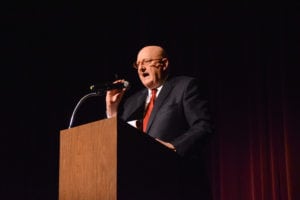
Ira Forman warned a Louisville audience that anti-Semitism is not going away, but Jewish communities must take care not to over or underestimate the threat. (Community photo by Tara Cocco)
Ira Forman stated the obvious:
“We are not going to end anti-Semitism,” he said, “not in my lifetime, not in my children’s lifetime, not in my great-great-grandchildren’s lifetime. This is not rocket science.”
However, the expert on anti-Semitism did offer a ray of hope to his Louisville audience: “We can push back.”
That’s why Forman, who served in the Obama administration as the State Department’s Special Envoy to Monitor and Combat Anti-Semitism (SEAS), didn’t just give an assessment on global anti-Semitism when he spoke at The J on Tuesday, February 20, he laid out a point-by-point plan to “push back.”
Speaking to about 50 people young and old, Forman said anti-Semitism is not like Islamophobia, homophobia or other forms of racism, all of which have their own unique characteristics.
To fight anti-Semitism, Forman laid out these steps:
• Know how bad the problem is – The world is not returning to the 1930s when Nazism was ascending, he said, and European Jewry in France, Great Britain and Germany will not disappear. But some communities in smaller countries under threat, such as those in Eastern Europe, could vanish.
• Get it right: Anti-Semitism doesn’t come exclusively from the political right or left, and it’s important to be as factual about the problem as possible. “If you cry wolf,” Forman said, “then when things happen that are truly bad, people will not listen to you anymore.”
• The problem is complex: Anti-Semitism differs from country to country, Forman said. Hungarian anti-Semitism bears little resemblance to French anti-Semitism, and understanding the differences involves talking to the Jews living there as much, if not more, than following analytics. It involves reading the newspapers in those countries and taking in news from many sources.
• Enlist civil society: A country’s government can be very responsive to the needs of its Jewish community and enact laws to protect it, but it’s not enough, Forman said. The people themselves must treat anti-Semites like pariahs. “If civil society is not with us, it’s over for us as a community.”
• Taming the Internet: Figuring out how to suppress anti-Semitic indoctrination online, he said, is something that must happen.
• Relevant education: Teaching the next generation not to hate is vital. However, while most European countries have mandatory Holocaust education, young people see it as a dry, irrelevant topic. Unless the subject is made meaningful to their own lives, Forman said they may dismiss it.
• Build coalitions: The Jews cannot deal with anti-Semitism alone. Coalitions of government, other ethnic groups and society in general are needed.
Taking these steps isn’t easy, Forman said. Sometimes it means letting go of long-held perceptions of the problem when facts refute them.
It also involves brutal honesty, he added. For instance, Jewish terrorists are not killing Muslims, but a small minority within the Muslim world has targeted Jews.
“You cannot stigmatize a whole people for the actions of a minority,” he said, “but you have to acknowledge it, or you’re not dealing with the problem.”
Forman graduated Magna Cum Laude in government from Harvard University and received a master’s of business administration from Stanford University’s Graduate School of Business.
He worked for the American Israel Public Affairs Committee as a legislative liaison from 1977 to 1981 before becoming executive director of the National Jewish Democratic Council – a position he held for 15 years.
He was the Jewish outreach director for the Obama for America campaign from 2011 to 2012 before moving to the State Department. Today, Forman is a senior fellow at the Center for Jewish Civilization, School of Foreign Service, at Georgetown University.
The position of Special Envoy to Monitor and Combat Anti-Semitism has existed in the federal government since 2004, Forman said. He considers it a great opportunity of his career to be named to the post, which he held from 2013 to 2017.
“It was a great, great job,” he said.


